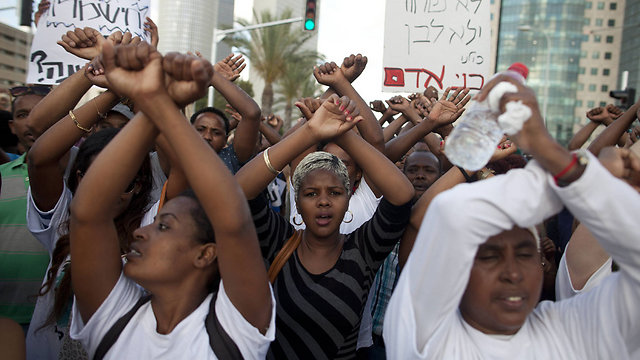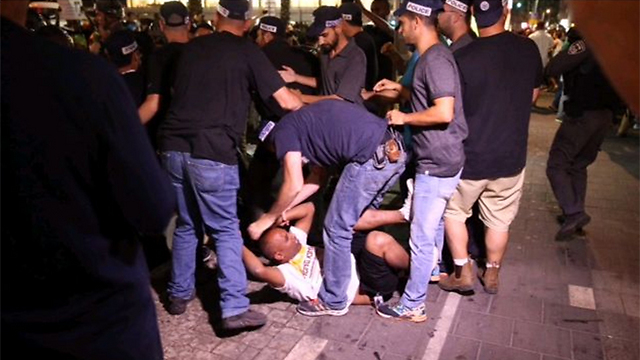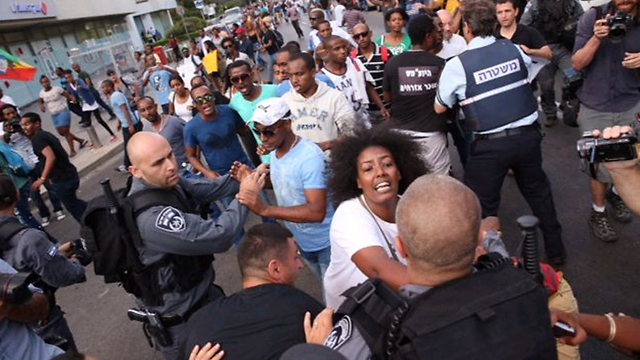Committee recommends limiting use of Tasers, equipping police with body cameras and handing out harsher punishments to racist officers, but these were removed from its report; police: Recommendations already being implemented in the field.
Recommendations made concerning the Israel Police by a committee detailing the widespread institutionalized and racial discrimination against Ethiopian Jewshave been removed from the committee’s report.
The report, headed by the Ministry of Justice’s director general, Emi Palmor, was compiled following extensive meetings with leaders, experts and representatives of the Ethiopian community in Israel.
It contains 53 practical recommendations meant to combat racism against Israelis of Ethiopian descent and help integrate them further into society. The recommendations deal with a wide variety of fields, including law enforcement, education and the media.

The report also contains 15 recommendations concerning the Israel Police, which include limiting the use of Tasers and increasing supervision over them, equipping police officers in areas with a large community of Ethiopian Jews with body cameras, and handing out harsher punishments to police officers who are found to be racist.
But these 15 recommendations were left out of the report, leaving it with only 38 recommendations.
This caught some in the Ministerial Committee for the Advancement of Ethiopian Immigrants by surprise, including Prime Minister Benjamin Netanyahu who heads the committee, as well as Minister of Justice Ayelet Shaked.
Meanwhile, Public Security Minister Gilad Erdan, Police Commissioner Roni Alsheikh and other senior police officers who appeared in front of the ministerial committee knew of the changes to the report. The recommendations to the Israel Police were removed from the report the night before, apparently due to pressure from Erdan.

The Israel Police was furious with the report, claiming it was slandering the force while the recommendations it entails are already being implemented in the field.
Those of Ethiopian descent who also attended the meeting, among them some members of the committee that compiled the report, threatened to leave in protest. “The commissioner refuses to accept these recommendations because of his ego,” they accused, “Other ministries have also had reforms, and yet they accepted the report and are willing to implement it.”
Shlomit Berhanu, a social activist and a member of the committee, said she did not understand the police’s objections, as it was a full partner in the inquiry process and in compiling the recommendations. “The claim that they are already implementing these recommendations in practice is detached from reality,” she said.

In response to the outrage, the prime minister announced that he will convene a meeting next week to discuss the recommendations concerning the Israel Police.
The police, meanwhile, said it did not pressure the committee to remove the recommendations concerning the force from the report.
“We didn’t wait for the committee’s report to act, and we’ve already been operating in the field for a year now, of our own initiative, to restore the relationship of trust with the Ethiopian community,” the police said in a statement. “The report adopted our existing work plan, and the reason the recommendations were left out of the report is because these measures are already being implemented. The prime minister asked us to present our work plan in an additional meeting—and so we shall do.”
Racism against Ethiopian national service volunteers
Also this week, during a session of the Knesset’s Immigration, Absorption and Diaspora Affairs Committee, the head of the Authority for National-Civic Service, Sar-Shalom Jerbi, reported that some of the institutions enjoying the volunteer work of girls doing national service are discriminating against those of Ethiopian descent.
Jerbi, however, refused to reveal which institutions did not accept girls of Ethiopian origin to volunteer with them, but said the displays of racism occurred in several institutions, and did not come from one group or another.
“A situation in which there is no punishment to discrimination against Ethiopian immigrants cannot be,” said committee chairman and Ethiopian immigrant MK Dr. Avraham Neguise.
“Let me tell you something astounding,” Jerbi responded. “The National-Civic Service directly funds 60-70 Israelis girls of Ethiopian descent out of its own pocket because some of the places they’ve been sent to will not fund them due to different and far fetched reasons. I’ve made a personal decision to not allow a situation whereby a national service volunteer from the Ethiopian community is left without a solution, so I provide the funds for them. This situation pains me.”
Sources familiar with the issuesaid that the volunteers of Ethiopian descent were politely rejected from working in villages for at-risk youth, NGOs aiding sick people, and others—solely because of the color of their skin.
“We’re creating special programs for girls from the Ethiopian community who need them,” Jerbi said. “Like improving their matriculation grades and life prep courses, so they could have an easier time joining the Israeli work force or studying.”
Jerbi also claimed that “different officials demanded that I retract my statements and are even threatening me—I don’t intend to take back my statements, because I exposed the truth.”
As reported by Ynetnews
